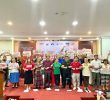
WE WANT JUSTICE. Father Pops' scholars hold the tarpaulin calling for justice for all the victims of extrajudicial killings under the counter-insurgency operational plan Bayanihan of the Aquino government. (davaotoday.com photo by Medel Hernani)
By Marieta Baste-Hernani and Marilou Aguirre-Tuburan
ARAKAN, North Cotabato — The coffin where the body of Fr. Fausto “Father Pops” Tentorio lay was bedecked with flowers. As the vigil continued day and night, so was the outpouring from ordinary folks who stayed for the daily mass and tribute. They paid respects for the missionary who spent much of his life to serve the poor in Mindanao.
Father Pops’ scholars — from elementary to college – were also present. Most of them, if not all, stayed in the whole duration of his wake. “Father Pops kept telling us, don’t base everything on the book and in the four corners of the classroom. You have to go outside and see the actual events. The society—that is our book, our classroom,” recounted Rey Rabadon, 20, a resident of Barangay Malibatuan in Arakan.
And as 15,000 people – most of whom he helped and touched lives — from Davao City, from the provinces, from Manila and Italy, witnessed his burial on October 25, Father Pops’ scholars promised to themselves, to continue and pursue the ideals and legacy of Father Pops.
“Father’s death will not stop me from moving forward. It will not weaken me,” said Rabadon, “I know that with Father Pops’ help, there are people who are willing to help me and those who are interested to go to school.”
Rabadon, a Bisaya, is currently in his third year, taking Bachelor of Science in Forestry, at the Cotabato Foundation College of Science and Technology. He has been Father Pops’ scholar since primary school. Two of his siblings have been Father Pops’ scholars until they got married. One graduated high school while the other one finished only third year in secondary school.
Orphans since 2003, after both their parents died drowning in the river after a heavy rain, Father Pops practically became their surrogate father.
“Father Pops took care of us. He supported us all throughout. And if he can’t go to us personally, he assigned his staff to deliver his support,” said Rabadon. “Everything that we need in school, he gave it to us since we became scholars until the time of his death,” he added.
For Isabel Indao, “(E)ven if he’s already gone, I promise to finish my education. He is my inspiration.”
Indao, 14, a resident of White Colaman in Kitaotao, Bukidnon is a Manobo. She’s one of Father Pops’ about 3,000 lumad (indigenous people) and peasant scholars from North Cotabato, Bukidnon and Davao del Norte. Currently, she’s a second year high school student of Notre Dame in Arakan. She’s been the missionary’s scholar since primary school.
“After secondary school, if he sees that you’re interested to pursue college, he will make you a scholar,” Indao said.
Indao is one of Father Pops’ special scholars who gets financial assistance and rice subsidy. Everything they need in school, including notebooks and uniforms, plus school fees and requirements are covered by Father Pops’ educational programs and scholarships.
Like Rabadon, Indao’s not the only missionary’s scholar in her family. “My older sibling was also a scholar but only until third year high school. She got married,” she said. “Father Pops saw that I was very interested to pursue and finish my studies. That’s why he made me his scholar,” she added.
To be an educator, is what she wants someday. “So that I can help my fellowmen and women gain knowledge,” she said.
Father Pops wanted his scholars to finish their studies and would reprimand them if they don’t take their studies seriously. “He will always tell us, don’t be absent if you don’t have any valid or big reason to do so,” she said.
Father Pops headed about 80 daycare centers in the areas of Arakan, Tulunan, Antipas, Makilala and M’lang, all in North Cotabato. Indao’s mother is a teacher in one of these daycare centers. Father Pops also supported 10 Ata-Manobo schools in Talaingod, Davao del Norte.
Father Pops’ teachings
The missionary challenged his scholars to go out and see how people were exploit
ed by the big land owners.
“Father Pops told us, Jesus Christ has sacrificed his life for the people. What about us humans? Can’t we sacrifice our lives for our fellowmen and women, too?” he said.
“Now, with his death, I can tell that Father Pops’ words were true. Because he sacrificed his life, not only for the youth, but for the people,” he said.
“Father Pops wanted to see everybody have a decent life. He wanted every family to eat three times a day,” Indao said.
Indao said Father Pops has been going to their area when she was still in her mother’s womb. She grew up knowing Father Pops, the man who ignored the muddy earth and distance just to see the condition of her family and other lumad-peasant families.
“He kept visiting to check on our condition,” she said. “He really wanted to help the poor, especially the lumads,” she said.
Indao shared that Father Pops shouldered all the medical expenses, including medicines and hospital bills, when her older sibling got very sick.
“He had many contributions for our community, from the water facility to daycare center. Even before his death, he had some plan to put up a hanging bridge over the river in our sitio (sub-village), so it would be easier for the students to travel from their houses to school and vice versa,” she shared.
If Father Pops sees parents who can’t afford to send their children to school, he will immediately register them under his educational programs.
Endearing himself to the lumads and peasants, Fr. Pops solicited the opposite from fanatic paramilitary groups.
Around 2003, when Indao was still in primary school, members of a military-backed paramilitary group Alamara went to their house and searched for Father Pops. Indao’s memories of this incident were still fresh. They hid Father Pops in a small ‘bodega’ and she and her siblings played outside to distract and divert the attention of the fanatic group. Her older sister played sick so the Alamara members could not go inside their house.
“They wanted Father Pops dead. They want to cut his ear and eat it,” she said.
Thanks to this peasant family, Father Pops’ life was extended for eight more years.
We want justice
“Gusto gyud nako nga pangitaan og hustisya si Father Fausto kay kadtong nagpatay sa iya, dili lang si Father Fausto iyang gipatay, lakip na among kaugmaon namong mga scholar, iya usab gipatay,” (I want to seek justice for Father Fausto because the one who killed him, he didn’t only kill Father Fausto, he also killed the future of his scholars), she said.
“Only Father Pops has helped us from our very dire condition. He’s like a government giving help and services to his people. Why did they kill him?” she asked.
Indao said her heart broke when she learned that he was murdered. “I can’t accept what happened to him. Our (the scholars) hearts bleed for Father Pops,” she said.
“Is is a crime to help others? Is that the reason why they killed him?” Rabadon said.
Rabadon said he’s not the only one who’s going to experience changes after Father Pops’ death. “What happens now to his scholars? How about the lumads? The people he has been helping? The schools he built?” he wondered.
“It’s very painful to lose someone who has been there all the time to help you. It’s very painful, even just the thought of it,” he said.
No accidental killing
“When they eliminate one like (Father) Fausto, as if they would want to eliminate those who’d like to serve the people that way,” Fr. Peter Jeremiah, PIME, said.
Fr. Jeremiah shared that the autopsy report reveals there were two kinds of bullet used against Father Pops. “The impact was instant that (Father) Pops could not be helped to survive,” he said.
According to the medico-legal expert, out of the 1,800 cases of autopsy he handled, Father Fausto was only the second case where the assassin used that kind of bullet. “Those fragmentation bullets are very unusual, very rare. So whoever prepared this killing used the most deadly kind of weapon,” he said.
The Italian priest suffered 10 gunshot wounds.
“This was not an accidental killing, it was purposely planned,” Fr. Jeremiah said. He said the killing of Father Pops cannot be done by any of the local people or someone who had some resentment, but can only be done by a very powerful group of people. “I am convinced that the planners involved several people who consented to this (killing),” he said.
He said what happened to Father Pops is a threat to everybody. “It is a threat to the community because by doing that they can kill the one who represents the dreams of the community and they can kill anybody,” he said.
Father Pops is the first Roman Catholic priest killed under the Aquino regime. He’s the 54th victim under the Aquino government’s counter-insurgency operational plan, Bayanihan. He’s the third member of the Pontifical Institute for Foreign Missions (PIME) killed during the last 26 years. The first one was Fr. Tullio Favali who was killed by Edilberto Manero in 1985 in Tulunan, North Cotabato. The second one was —- who was killed in Zamboanga.
Siegfred M. Red, secretary of the CPP’s (Communist Party of the Philippines) Southern Mindanao Regional Party Committee, said, in a tribute published in national and local dailies, “(T)he Oplan Bayanihan of the US-Aquino Regime has made him (Father Pops) a victim, a martyr, a symbol of the political repression of the decaying system in the country. His death has exposed the ferocity of the AFP and the Aquino regime; without compunction, it took the life of a missionary, a civilian.”
“His killing unmasked the viciousness of the Oplan Bayanihan which employs political killing as a continuing and explicit policy of the Aquino government for counterrevolution, less than a year after it was implemented. The 6th ID-Eastern Mindanao Command of the AFP carries the blood debt for Fr. Pops,” added Red.
The military, immediately after Father Pops’ killing, denied any hand. The AFP’s Eastern Mindanao Command spokesperson Col. Leopoldo Galon, Jr., went as far as to accuse the CPP of masterminding the killing of Fr. Pops, a charge that the military, as of press time, has not substantiated.
Hope springs
Indao said that Fr. Pops may be an Italian but his heart was undoubtedly Filipino, “he was so kind and giving. He feels for every poor family like mine. He’s the kindest person we’ve ever encountered.”
CPP’s Red praised Fr. Pops as “an Italian who became a great Filipino–a communist, an internationalist, who devoted more than half of his life to serve the interest of the poor Filipino masses and make the cause of the Filipino people as his own.”
Rabadon said that actions and mobilizations must be undertaken to bring the perpetrators to justice.
But for now, he can only hope, that whoever replaces Father Pops, “(H)e will be like Father Pops who seeks the interest of the people and not only his own.”
“People like (Father) Fausto is still moving us. We share the same kind of commitment and the same feeling that we cannot abandon the people. And so even if he’s buried, he’s still alive in many of us, and will continue his work,” Fr. Jeremiah said. (Marieta Baste-Hernani and Marilou Aguirre-Tuburan /davaotoday.com/bulatlat.com)
arakan, cotabato, davao today, Education, EJK, extra judicial killings, Extrajudicial Killings, fausto pops tentorio, Fr. Pops, Mindanao, north cotabato, scholars, students









